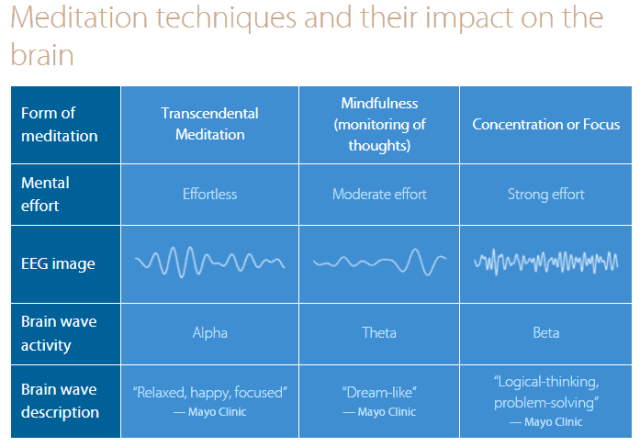Stressed? Anxious? You are far from alone. Over 40 million people, or 18% of the population, suffer from anxiety disorders in the United States. It’s so common today it seems hard to find to find someone who isn’t stressed! Sadly, this trend is only accelerating. While I can’t provide a simple cause for your stress, I do have a simple solution. Backed by science, transcendental meditation has been proven by decades of countless studies to lower stress levels and anxiety, while also promoting calm and relaxation.
Several Doctors Practice Transcendental Meditation! Doctor Gary Kaplan is an American Neurologist and Clinical Associate Professor at New York University School of Medicine. He discusses the benefits and science of Transcendental Meditation and how it reduces stress and anxiety.
Transcendental Meditation, practiced for 20 minutes, twice per day, is backed by science and hundreds of studies to help with a wide range of physical and mental issues. They include, but are not limited to: depression, addiction, insomnia, PTSD,ADHD, and Autism.
In fact, there are dozens linked to reduced stress and anxiety alone. Recommended by doctors and endorsed by famous celebrities – literately millions have benefited worldwide. It has changed my life for the better In just a few short weeks, Transcendental Meditation has already reduced my own stress and anxiety and changed my life for the better. If you give it a chance, it can change yours, too!
How is Transcendental Meditation Backed by Science and How Does It Reduce Stress?
We all know stress and anxiety are bad for your mind, but it can wreak havoc on your body, too. What you think can literately affect the body! Stressful thoughts cause the brain to stay in a heightened brainwave state called “beta “for prolonged periods of time. Over time, this can significantly increase a stress-response hormone in our body called cortisol. High levels of cortisol can destroy our immune system and literately ages us.
The good news? Transcendental Meditation has been measurably and scientifically proven to reduce stress and the corresponding cortisol levels in the body. This technique slows down our heart and breath rate and changes our brain wave state to “alpha.” Alpha brainwaves are associated with calm and alertness. They also a perfect state for work and productivity!
Reducing Stress For Centuries With Over 40 Years of Science Backed Transcendental Meditation Research and Studies!

Transcendental Meditation has been practiced for centuries in India. However, this technique was popularized worldwide and in the West by Maharishi Mahesh Yogi in the late 1950’s. Transcendental Meditation had scientific roots from the beginning. Before becoming a spiritual leader, Maharishi also earned a degree in physics. Thanks to Maharishi, Transcendental Meditation become hugely popular in the late 60’s in the United States and the U.K. Many celebrities practiced as well. The Beatles considered him their guru and spiritual advisor! Thanks to all this fame, there have been countless scientific studies on Transcendental Meditation. Just on the specific topic of stress and anxiety alone, there have been over 40 studies – stretching back from 1977!
One Study linking Transcendental Meditation with lower Response to Stress and Lower Blood Pressure, Heart Rate, and Improved Cardiac Output.
Lets discuss some of the most important and more recent scientific studies on the impact of transcendental meditation and stress. A good place to start is “Impact of Transcendental Meditation on cardiovascular function at rest and during acute stress in adolescents with high normal blood pressure.”
Published in 2001 by V. A. Barnes, F. A. Treiber, H. Davis in the Journal of Psychosomatic Research, it’s a great study because it focuses on high blood pressure. Unlike the feelings of stress, high blood pressure (also known as hypertension) is easily measurable. We know there’s a strong connection between hypertension, fast heart rates, and stress. In this study, the adolescent participants all had naturally high blood pressure. The end result?
After just two months of practicing transcendental meditation, the TM group’s blood pressure went down. Similarly, when given acute laboratory stress (social stressor interview and car driving stressors), those practicing Transcendental Meditation also outperformed the control group considerably in blood pressure, heart rate, and cardiac output.
Effect of Transcendental Meditation on Employee Stress, Depression, and Burnout
Although the last study helped prove the link between transcendental meditation, heart health, and less stress, you might still not be convinced. What about adults? How about those with normal blood pressure? This study is for you!
This scientific study, “Effect of Transcendental Meditation on Employee Stress, Depression, and Burnout: A Randomized Controlled Study” focuses on normal adults with no underlying cardiovascular issues. Published in The Permanente Journal in 2014 by Elder C, Nidich S, Moriarty F, and Nidich R., it is relatively new. Another strength of this study is that it is a randomized control study which is considered the golden standard of scientific studies.

It consisted of 40 participants employed as teachers and staff in a school for children with severe behavioral issues. A highly stressful place to work! However, this study is likely applicable to anyone in a high-stress career or environment!
The results? The group that practiced transcendental meditation had significantly less perceived stress, depression symptoms, and burnout. Overall effects were determined through a multivariate analysis of covariance.
“Studies indicate that practice of TM reduces psychological and physiologic response to stress factors, including decreased sympathetic nervous system and hypothalamic-pituitary-adrenal axis, and reductions in elevated cortisol (stress hormone) levels.“
Elder C, Nidich S, Moriarty F, Nidich R. Effect of Transcendental Meditation on employee stress, depression, and burnout: a randomized controlled study. The Permanente Journal 2014 18(1):19-23.
The group that practiced transcendental meditation had significantly less perceived stress, depression symptoms, and burnout
This has huge implications because, as mentioned, these results are likely to be applicable to other high stress careers. Especially highly similar ones such as those who work with people with special needs, nurses and doctors who work with mentally ill patients, and employees working in corrections and prisons.
A meta-analysis of randomized controlled trials – Transcendental Meditation on Anxiety
We have shown two studies so far. The first showed clear and measurable physical benefits from transcendental meditation on adolescents with high blood pressure, including lower blood pressure, lower heart rate, improved cardiac output, and a better response to stress. The second showed a high-quality randomized controlled study that showed a measurable positive outcome for those in transcendental meditation group for stress, depression, and burnout.
In this study, A meta-analysis of randomized controlled trials – Transcendental Meditation on Anxiety, we now look at a more conclusive study with more data that includes a meta-analysis on the relationship between transcendental meditation and trait anxiety. This study consisted over nearly 1300 participants from many diverse backgrounds. What were the results?
No side effects. Strong results that outperformed many other alternative treatments. Best of all, those with high anxiety achieved the greatest effects!
Literately DOZENS of Studies Prove the Link Between Transcendental Meditation and Reduced Stress and Anxiety
The truth is, we can list and explain DOZENS of studies proving the link between Transcendental Meditation and reduced stress. We can’t list them all! Of course, you can always read more directly on their site, too. Or, you can go even further and take the course yourself. I did it myself. As a result, my stress and anxiety levels dropped SIGNIFICANTLY!
Comparing Other Types of Meditation Techniques to Transcendental Meditation
What about other types of meditation? Many do have real benefits and are certainly much better than not meditating. However, Transcendental Meditation stands out as the best type of meditation for stress and anxiety.
Transcendental Meditation Simply Has More Science behind it than Any Other Technique!
In a meta-analysis of 146 studies conducted at Stanford University, the analysis proves Transcendental Mediation is TWICE as effective as other techniques for anxiety! In another study, it reduces stress cortisol levels by 30%!

Source: http://tmwellbeing.com/why-tm/health-research/
No Effort. No Experience Required!

Perhaps one of the best characteristics of Transcendental Meditation is that virtually anyone can learn it. Quickly, too. Other techniques, such as Zen, Vipassana, Mindfulness, Kriya Yoga generally require a moderate or even strong effort. For many, Zen can be especially hard to learn and master.
On the other hand, transcendental meditation is effortless.
Why? A lot of it has to do with brainwave states. Different meditation techniques produce different brainwave states with different effects on the mind and body. This explains different levels of difficulty. Especially when it comes to stress, brainwave states also have big implications for our well-being.
We have five brainwaves states.
In order of speed from slowest to fastest, they are delta, theta, alpha, beta, and gamma. Delta is for very deep sleep. Delta is the slowest brain wave state. Theta is a waking or dream-like state. Brainwaves produced in theta are a little faster than delta, but still very slow. Alpha, a calm and relaxed state. Beta, a faster state for thinking and concentration. And finally Gamma, the fastest brain wavs associated with intense focus.
Our outside environment as well as our inner environment, and how we speak to ourselves and our thoughts, play a large role in determining our brainwave activity. In delta and theta, you are generally in your inner world. You are completely unconscious in delta, for example. On the other end of the spectrum, beta brainwave activity is associated with increased thinking and concentration.

Brainwave Science Links High and Excessive Beta Brainwaves to Increased Stress and Anxiety
Some of us, especially when stressed or anxious, have too much brainwave activity in the beta brainwave state. In today’s fast paced world, often we overthink and overanalyze every situation. As a result, this creates anxiety for many of us. Even more troubling, these repetitive thought patterns, especially when negative, can significantly worsen it.
The alpha brainwave state helps us get out of our head. We are calm, but still alert. This makes sense logically. Alpha is right in the middle of the spectrum, and is ideal for daily life in many ways. This is because you are aware of both your outer world and inner world at the same time. Alpha is the BEST brainwave state to reduce stress and anxiety, and alpha is the brainwave state achieved during transcendental meditation!
Other Benefits of Transcendental Meditation
It’s for virtually anyone. You can do it anywhere. It only takes 20 minutes, twice per day. You will positive effects right away, and they will improve as you get better.
You will sleep better, and fall asleep more easily. Your less likely to fight with your partner, your family, your friends, or coworkers. Why? Your able to better separate thoughts from impulses. This means your more likely to pause and think before you react. I can’t tell you enough how this has personally helped me in both my personal and professional relationships.
More calm. Less Anxiety. Less Stress. And unlike medication, there are no side effects.
Try Transcendental Meditation today!
References:
*This article was originally published at L’Aquila Active and was reposted with full permissions.
You can read the original article here: “Reduce Stress: The Science Behind Transcendental Meditation”


